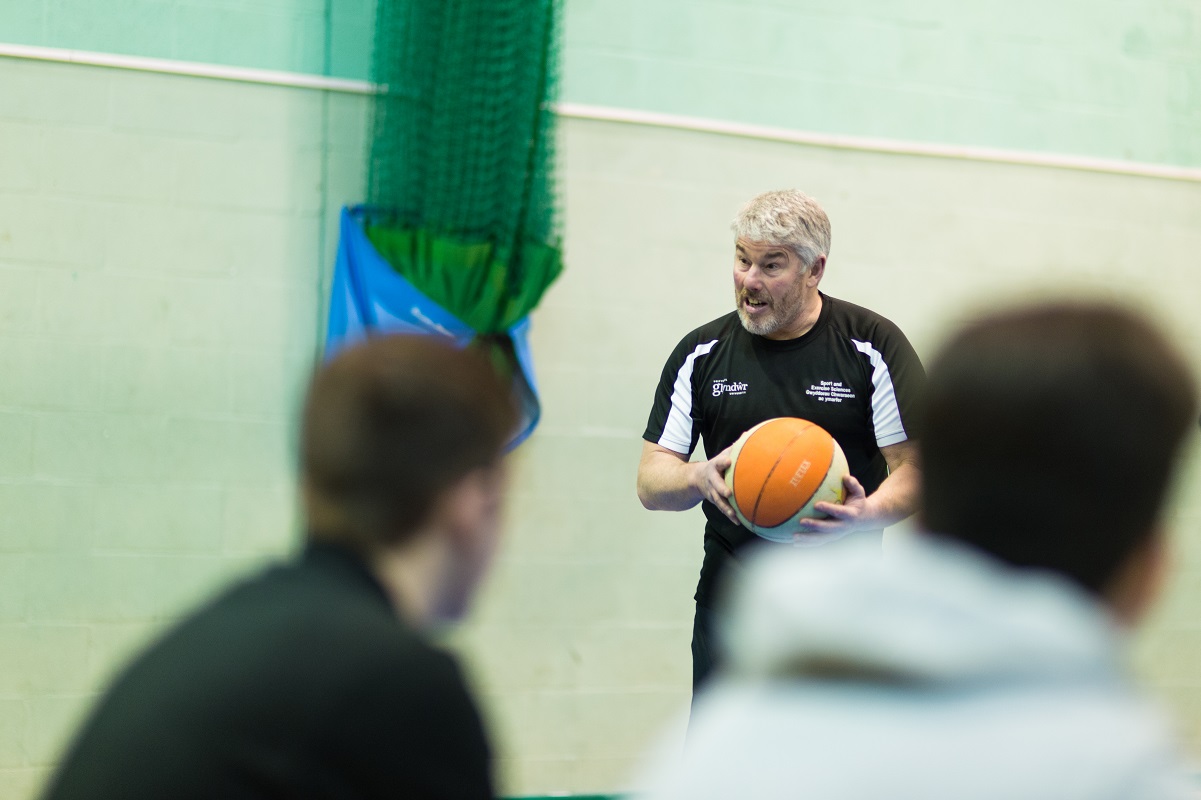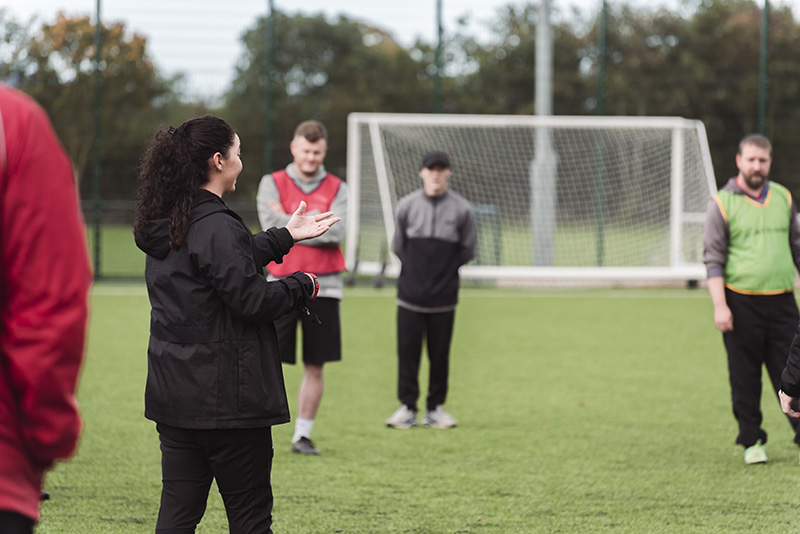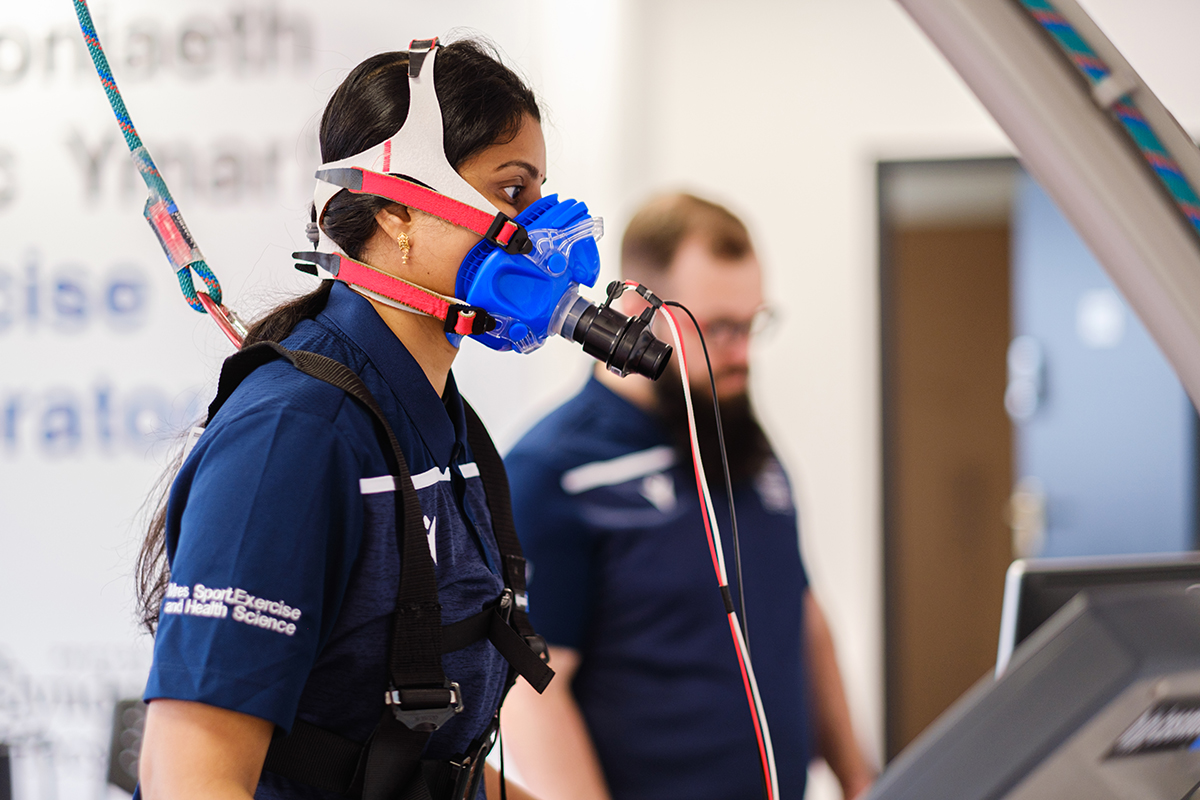FdSc Coaching: Sport and Fitness

Course details
UCAS Code
FDSF
Year of entry
2024
Duration
2 YRS (FT)
UCAS Tariff
48-72
Institution Code
G53
Location
Wrexham
Course Highlights
Elevate
your learning with Widnes Vikings Partnership
Additional Workplace Qualifications
Level 2 gym instructor and Level 3 personal trainer qualifications included
Access
to cutting-edge equipment and facilities
Why choose? this course?
Our FdSc sports coaching degree has been designed to offer our students a hands-on approach to learning coaching skills and approaches whilst incorporating our outstanding geographical location within North Wales.
The course:
- provides you with all the necessary skills and insight required to work within the sports and fitness industry
- involves collaboration with external partners to help ensure you leave us with a CV bursting with number of recognised awards and qualifications
- helps you to get that first foot on the employment ladder.
- *is part of a subject area rated 2nd in Wales for satisfaction with teaching in the Sports Science subject league tables, The Guardian University Guide 2022.
- leads onto the enrolment of 1-year top-up if you choose to continue, which will provide you with a full BSc (Hons) qualification.


Coaching: Sport and Fitnessat Wrexham University
Find out more about the Coaching for Sport and Fitness degree and the opportunities available from one of its programme leaders, Jon Hughes.
Key course features
- The programme has additional, free of charge, integrated qualifications embedded within it: Level 2 Gym Instructor, Level 3 Personal Trainer, Hudl Sportscode Scripting Levels 1 & 2, Leaders Awards and Level 1 qualifications in numerous sports and activities as well as basic operating qualifications.
- The programme offers real-world opportunities to experience the workplace
- The programme is taught by lecturers from a wide range of backgrounds who are experienced, applied practitioners (from sports coaches to analysts, psychologists, and physiologists) and researchers within the fields of sport and exercise.
- Study in a British Association of Sports and Exercise Sciences (BASES) accredited laboratory.
- Field trips to explore the sport and fitness challenges within North Wales.
- Cutting-edge technology including our strength & conditioning suite and human performance lab to support your understanding and enjoyment of the topics covered.
- We have an excellent support and personal tutor system to ensure students are supported throughout their studies.
- Collaboration with external partners ensures students can leave us with a CV bursting number of recognised awards and qualifications, helping to get that first foot on the employment ladder.
- Our partnership with Rugby League’s Widnes Vikings will provide you with the opportunity to access real-world learning experiences within an elite sporting environment and benefit from a wealth of professional knowledge.
What you will study
The FdSc degree is initially made up of a two-year study programme, with the option after the FdSc is completed to enrol on a 1-year top-up. Completion of the top-up year will provide students with a full BSc (Hons) qualification.
LEVEL 4 (YEAR 1)
In this year students are introduced to all the elements associated with sport and fitness. Students gain an understanding of the link from theory to practice across a range of disciplines including Coaching, Strength and Conditioning, performance analysis and aspects of psychology and physiology. You will have 36 hours of contact time per module.
MODULES
- Fitness and Conditioning for Sport (20 credits) This module aims to provide you with an overview of strength and conditioning training methods. You will also develop your knowledge and coaching skills during practical sessions.
- Analysing Performance: Making a Difference (20 credits) This module aims to provide you with an overview of performance analysis and how the use of it can utilise time and talent more effectively.
- Understanding the Coaching Process (20 credits) This module aims to help you understand the elements that go into making a good coach and considers how the coaching profession has been driven forward through innovative research into the discipline around how people learn and communicate.
- Outdoor Pursuits (20 credits) This module aims to provide opportunities to experience outdoor pursuits and how they are organised and delivered.
- Fundamental Skills in Sport (20 credits) This module aims to provide opportunities for students to assess a range of sport/fitness environments, to examine the characteristics that sport requires of its participants, regardless of level.
- Academic Discovery within the Sports Sciences (20 credits) This module investigates qualitative and quantitative approaches to researching sport science disciplines
LEVEL 5 (YEAR 2)
MODULES
- Fitness and Conditioning Methods in Practice. (20 credits) This is an applied module with embedded industry qualifications. Taking a holistic approach to fitness and conditioning, you will explore a range of training methods from the position of both participant and fitness/strength & conditioning coach.
- Analysing Performance: Technique Impacting Tactics (20 credits) This module provides students with an opportunity to explore the use of performance analysis techniques within sport and fitness to promote tactical and planning development, through improving baseline technical qualities.
- Becoming a Coach (20 credits) This module encourages the student to examine the pedagogical issues faced by sports/fitness coaches whilst reflecting and evaluating their own practice.
- Delivering Outdoor Pursuits (20 credits) This module offers the experience of delivering non-traditional sports, identifying similarities and unique features that outdoor activities present.
- Coaching Environments (20 credits) This is a negotiated module that requires the student to identify a sport of their choice. The student will then immerse themselves within the environment to understand how things operate and the systems that support this operation.
- Academic Discovery - Building Strong Research Ideas (20 credits) This module aims to educate students on carrying out research from both a qualitative and quantitative perspective. Students will gain insight into different research methods and analyses whilst also starting to create an idea for final year dissertations should they choose to move on to Level 6.
There is an option to stay with us for an extra year to graduate with a BSc (Hons) undergraduate qualification.
The information listed in this section is an overview of the academic content of the programme that will take the form of either core or option modules. Modules are designated as core or option in accordance with professional body requirements and internal academic framework review, so may be subject to change.
Entry requirements & applying
For entry onto our degree programme, we require the following:
- At least 48-72 UCAS points at A2 level or equivalent.
- Experience in a sports/fitness coaching environment is an advantage but not essential.
If you have educational records that are more than 5 years old, we will consider your application with a strong personal statement outlining relevant experience within last 5 years as a substitute, provided you have the relevant UCAS points.
The UCAS points may be counted from a wide variety of qualifications such as:
- Welsh Baccalaureate
- Progression and Advanced Diploma
- BTEC/EDEXCEL both National Diplomas and Certificates
- Scottish qualifications at Advanced Higher level
- Irish leaving Certificate Higher examinations
- International and European Baccalaureates
Applicants may enter the programme at various levels with Recognition of Prior Learning (RPL) or Recognition of Prior Experiential Learning (RPEL) in accordance with the University General Regulations. Mature students with relevant experience are also welcome to apply and be considered on an individual basis.
A formal DBS is required for the programme. Support with this is provided.
Teaching & Assessment
Teaching and Learning
Wrexham University is committed to supporting our students to maximise their academic potential and the introduction of our Active Learning Framework (ALF) helps deliver this commitment. Grounded in the University’s values of being accessible, supportive, innovative, and ambitious, ALF will support flexible learning that makes the best use of spaces on Campus together with digitally enabled learning opportunities designed to be accessed anytime, anywhere as appropriate. In addition, ALF embodies ways of teaching and learning that create and support a sense of belonging for students – critically important for us as a university that prides itself on being a supportive community.
Incorporating everything mentioned above, our teaching will use a combination of face-to-face and online techniques. There are practical elements across all years that may include off-campus trips to environments that facilitate the learning experience. On average, students will receive 16 hours of taught content through the delivery of ALF per week.
In addition, the university offers workshops and support sessions in areas such as academic writing, effective note-making and preparing for assignments. Students can book appointments with academic skills tutors dedicated to helping deal with the practicalities of university work. Our student support section has more information on the help available.
In terms of particular needs, the University’s Inclusion Services can provide appropriate guidance and support should any students require reasonable adjustments to be made because of a recognised prevailing disability, medical condition, or specific learning difference.
Assessment
A wide range of assessment methods will be used to test your knowledge and understanding. This includes essays, portfolios, practical sessions, reports, presentations, online discussions, and case study evaluations. You will be assessed on your ability to describe, explain, and analyse sport / fitness coaching concepts. This will be achieved through the investigation of previously published research, individually collected field-based data and specialist computer software and equipment.
If Level 6 study is taken, your time with us culminates in the submission of an independent Learning opportunity (dissertation project), in an area that supports your future aspirations.
Career prospects
Our Careers & Employability service is there to help you make decisions and plan the next steps towards a bright future. From finding work or further study to working out your interests, skills and aspirations, they can provide you with the expert information, advice and guidance you need.
Common graduate employment pathways include sport, leisure, tourism, management, education, research and health and fitness, including:
- Sports Coach
- Outdoor Pursuit Instructor
- Sports Development Officer
- Health Practitioner
- Personal Trainer
- Sports Performance Analyst
- Teacher
- Strength and Conditioner
- Military Services PT instructor
Fees & funding
You do not have to pay your tuition fees upfront.
The fees you pay and the support available will depend on a number of different factors. Full information can be found on our fees & finance pages. You will also find information about what your fees include in the fee FAQs.
All fees are subject to any changes in government policy, view our undergraduate fees.
Programme specification
Accommodation
If you’re looking for a place to stay while you study then take a look at our accommodation pages to get more information on your options, including our on-campus halls of residence Wrexham Village.


